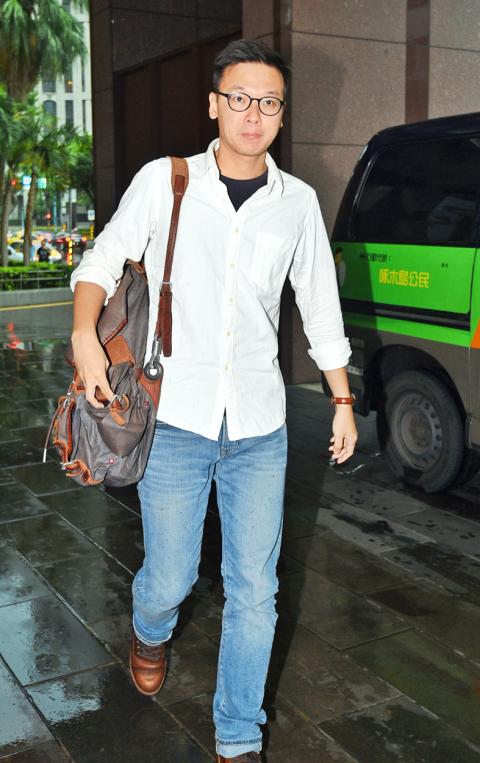Prominent leaders of the Sunflower movement yesterday entered not guilty pleas as their trial for storming the legislature began, saying they would face the justice system head-on.
Lin Fei-fan (林飛帆), Chen Wei-ting (陳為廷) and Huang Kuo-chang (黃國昌) made the remarks at the Taipei District Court yesterday.
They face charges related to student-led protesters occupying the Legislative Yuan’s main chamber from March 18 to April 10, 2014, in what became known as the Sunflower movement.

Photo: Lo Pei-der, Taipei Times
The trio were among nine defendants summoned to appear in court yesterday.
Judges reviewed more than 100 minutes of video from March 18 to determine whether the defendants were guilty of inciting others to commit an offense, obstructing an officer in discharge of duties and illegal entry, among other charges.
Prosecutors said there are a total of 21 defendants, with Lin, Chen and Huang among the first of three groups scheduled for court appearances.
Prior to entering the court room, Lin said: “I feel this is a good opportunity to defend ourselves in court and to argue the legitimacy of our actions. We have been consistent in our stance when taking on the justice system: that we will face it head-on and we will not evade any legal responsibility.”
“The Sunflower movement was to rescue Taiwan’s constitutional democracy, which was teetering on the edge of a precipice,” Huang said. “So we had to initiate this civil disobedience action to save it. Under our nation’s new democratic system, this movement has a high degree of legitimacy. So we hope these issues can be deliberated upon during the judicial proceedings of this case.”
He said the protest was precipitated by Chinese Nationalist Party (KMT) Legislator Chang Ching-chung (張慶忠), who, in violation of legislative procedures, attempted to fast-track the cross-strait service trade agreement through the legislature in 30 seconds on March 17.
“Due to the so-called ‘30-second incident,’ which destroyed Taiwan’s constitutional democracy, the real culprits were Chang Ching-chung and [former president] Ma Ying-jeou (馬英九), and also the party they belonged to,” Huang told reporters.
“We fervently believe we are not guilty [of the charges laid by prosecutors]. The guilty ones are Ma, who trampled upon Taiwan’s democratic system, and Chang, who wrecked the legislature’s checks-and-balance mechanism. Those who stood up with courage against them are not guilty, as they tried to save Taiwan’s democracy and freedom,” he said.
Chen said he was not at liberty to speak about the case, because he is serving at a government agency in lieu of his mandatory military service.

CHAOS: Iranians took to the streets playing celebratory music after reports of Khamenei’s death on Saturday, while mourners also gathered in Tehran yesterday Iranian Supreme Leader Ayatollah Ali Khamenei was killed in a major attack on Iran launched by Israel and the US, throwing the future of the Islamic republic into doubt and raising the risk of regional instability. Iranian state television and the state-run IRNA news agency announced the 86-year-old’s death early yesterday. US President Donald Trump said it gave Iranians their “greatest chance” to “take back” their country. The announcements came after a joint US and Israeli aerial bombardment that targeted Iranian military and governmental sites. Trump said the “heavy and pinpoint bombing” would continue through the week or as long

TRUST: The KMT said it respected the US’ timing and considerations, and hoped it would continue to honor its commitments to helping Taiwan bolster its defenses and deterrence US President Donald Trump is delaying a multibillion-dollar arms sale to Taiwan to ensure his visit to Beijing is successful, a New York Times report said. The weapons sales package has stalled in the US Department of State, the report said, citing US officials it did not identify. The White House has told agencies not to push forward ahead of Trump’s meeting with Chinese President Xi Jinping (習近平), it said. The two last month held a phone call to discuss trade and geopolitical flashpoints ahead of the summit. Xi raised the Taiwan issue and urged the US to handle arms sales to

BIG SPENDERS: Foreign investors bought the most Taiwan equities since 2005, signaling confidence that an AI boom would continue to benefit chipmakers Taiwan Semiconductor Manufacturing Co’s (TSMC, 台積電) market capitalization swelled to US$2 trillion for the first time following a 4.25 percent rally in its American depositary receipts (ADR) overnight, putting the world’s biggest contract chipmaker sixth on the list of the world’s biggest companies by market capitalization, just behind Amazon.com Inc. The site CompaniesMarketcap.com ranked TSMC ahead of Saudi Aramco and Meta Platforms Inc. The Taiwanese company’s ADRs on Tuesday surged to US$385.75 on the New York Stock Exchange, as strong demand for artificial intelligence (AI) applications led to chip supply constraints and boost revenue growth to record-breaking levels. Each TSMC ADR represents

State-run CPC Corp, Taiwan (CPC, 台灣中油) yesterday said that it had confirmed on Saturday night with its liquefied natural gas (LNG) and crude oil suppliers that shipments are proceeding as scheduled and that domestic supplies remain unaffected. The CPC yesterday announced the gasoline and diesel prices will rise by NT$0.2 and NT$0.4 per liter, respectively, starting Monday, citing Middle East tensions and blizzards in the eastern United States. CPC also iterated it has been reducing the proportion of crude oil imports from the Middle East and diversifying its supply sources in the past few years in response to geopolitical risks, expanding